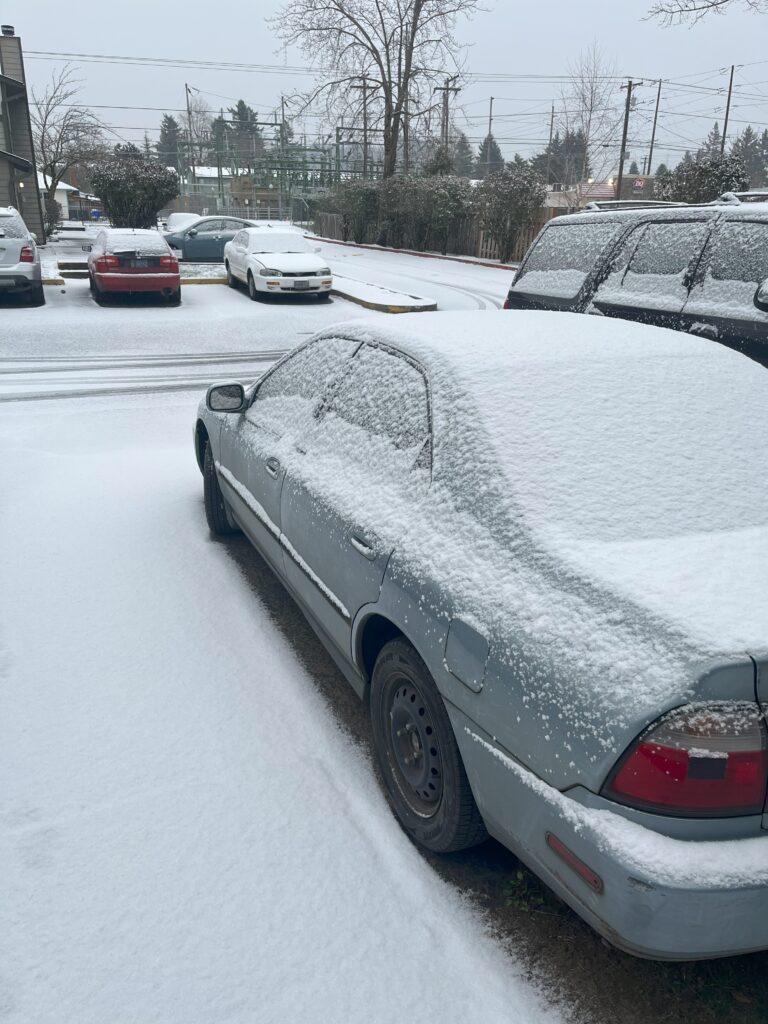The Poverty Tires
My car is old and slowly wearing out. I do a little maintenance now and then, but I can’t afford any big repairs or overhauls. Not gonna rebuild the engine or transmission, not gonna repaint it, not gonna beef up the suspension. I’m just driving it until I can afford something better.
There’s a mindset into which I fall. It’s a reaction to stress and not having enough safety or resources. A poverty mindset. I accept that this is all I can afford, and then I justify and rationalize that this is the only option. For some reason this mindset is easier to get into with regard to a car, although I know I’ve felt this way about my living spaces, as well. Adequate housing is a human right but if I’m depressed, the level of adequate for me and me alone gets lower and lower, y’know?
I know I’ve written about this before, but another reminder has come up, and again, it’s about my car. Specifically the tires.
When I first got the car, the tires were already a bit worn, and I was making less than poverty wages, so I put zero money into replacing them. I’d just top up the air once in a while, and as the tires wore further, I’d have to top them up more and more.
Until one day, one of the tires failed in an interesting but terrifying way: the pressure caused a big bubble to pop out, but the tire itself didn’t leak. It just bulged. As you can imagine, trying to drive that way caused the steering wheel to shake, and a tremendous noise. I was already stressed about my job at the time, which required a long commute. I feared the worst, as I often do, and thought that the suspension was damaged somehow.
A friend helped me out by correctly diagnosing the issue, and paying for four replacement tires, a cost of about $200 for OK-ish used tires. That was a cost I didn’t think I could afford, but I was wrong. I definitely couldn’t have afforded replacing the whole car, or the costs of an accident involving another car… or another person. I did have insurance but it was the bare legal minimum. I was lucky in not having anything worse happen.
From that point on, I did pay more attention to my tires. I kept them full. And I replaced them after normal wear, a year later. I had to use a credit card and pay it off over time, but I did it because I wanted to avoid that horrible out-of-control feeling that my car might kill me if I neglected it.
That next set of tires wore normally for a while, until the steering started to get a little wobbly and pull to the left, and then it started making noise again, and this time, I took it to a mechanic. The mechanic said I just needed to rotate the tires, which for the non-car person means to swap them around, left to right, basically (different cars have different rotation patterns.)
I drove them like that for a while, saving up for another new pair, and this time, I bought new tires from a tire company that offers a 10 year warranty. I did not buy the warrnaty. I didn’t think it was worth it. New tires was enough for my peace of mind. But at some point, I noticed one of the tires, the driver’s side front, had a slow leak.
Remember that poverty mindset I mentioned? I nursed that nagging slow leak for months, topping up the tire with a cheap air compressor I had, because I was again underemployed and afraid of spending money. I didn’t think I could afford to replace them.
And then the cheap air compressor broke. I didn’t have the means to bandage this problem anymore. I found the source of the slow leak: a nail stuck in the tread. That convinced me to bring the car back to the tire shop, where, to my amazement, they replaced the tire and it’s mate on the other side for a nominal fee.
The sales person explained that I could add on the warranty to cover all four tires for cheap; $10 per tire. They would then replace any tire for any flat or road damage for the next 10 years. It was finally worth it to me, after years of giving myself stress by trying to nurse along on the cheapest option.
That was a few months ago. I’ve been hypervigilant about tire pressure, since my cheap air compressor was broken and I was once again unemployed. Last night, though, after getting a good payday, I bought a new air compressor, and because it was a Prime Day special, got it overnight.
Just went out to the car to check the pressure and top up all the tires. I assumed after months of driving they’d be dangerously low. This is the point where my poverty mindset had fucked me up.
The tires were low but not dangerous. And I had the tool I needed to fix it, by spending a little money. I can afford basic maintence. I don’t have to live with broken and failing things.
Might be time to buy a newer car, Brian.
